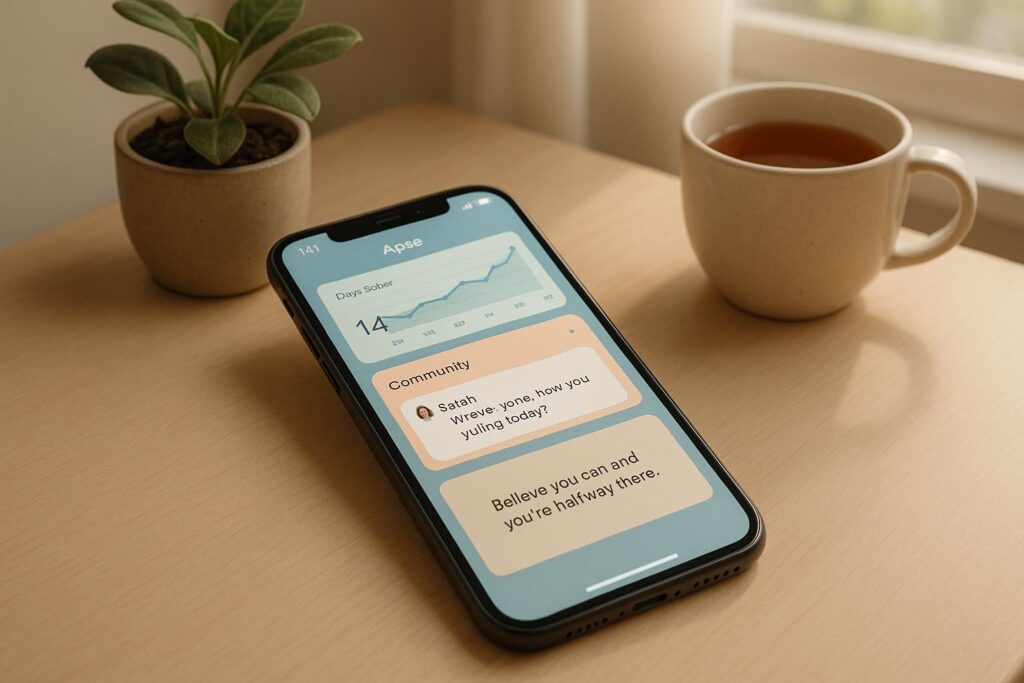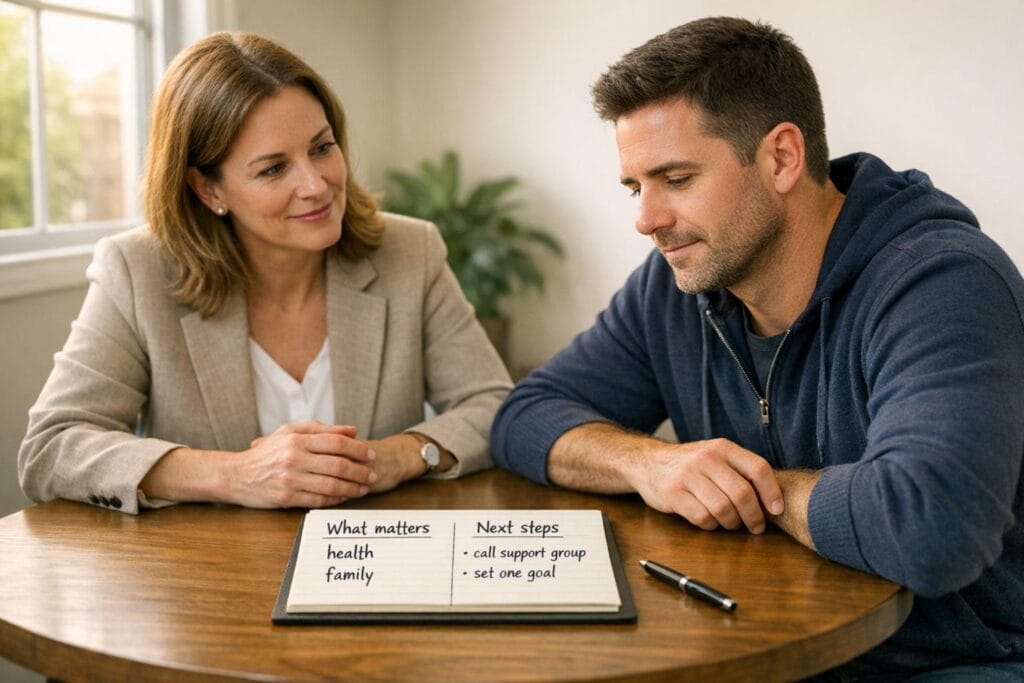Looking for tools to aid your recovery journey? These 12 apps offer support, tracking, and community to help you stay on track. From sobriety tracking to evidence-based therapy tools, these apps provide 24/7 assistance, whether you’re battling alcohol, drug addiction, or other habits. Here’s a quick look at their key features:
- I Am Sober: Tracks sobriety milestones, savings, and offers a supportive community (Free & Premium: $9.99/month).
- Sober Time: Tracks sobriety in real-time with motivational forums (Free).
- Nomo: Provides sobriety clocks, badges, and accountability partners (Free).
- WEconnect: Science-backed rewards and peer support meetings (Free & Premium: $40/month).
- Reframe: Focuses on reducing alcohol use with CBT tools and mindfulness (Free trial, $100/year).
- Sober Grid: A global sober social network with peer recovery coaching (Free & Premium: $99/month).
- Quit That!: Simple tracking tools and motivational features (Free).
- SoberTool: Personalized support and motivational messages (Free).
- Twenty-Four Hours a Day: Daily meditations inspired by AA’s Big Book ($5.99).
- Pear reSET: Clinically tested CBT program for substance use recovery (Free with healthcare plans).
- 12 Steps AA Companion: Digital version of AA’s Big Book with sobriety tracking ($1.99–$2.99).
- Sober Living Centers: Tracks milestones and connects users with recovery professionals (Free).
These apps complement professional care, offering tools to manage cravings, track progress, and connect with others. Choose one that aligns with your goals, whether it’s sobriety tracking, therapy integration, or community support.
Quick Comparison
| App Name | Free Version | Premium Cost | Key Features |
|---|---|---|---|
| I Am Sober | Yes | $9.99/month or $119.88/year | Sobriety tracking, CBT tools, private groups, motivational quotes |
| Sober Time | Yes | Free | Real-time tracking, motivational forums |
| Nomo | Yes | Free | Sobriety clocks, badges, accountability partners |
| WEconnect | Yes | $40/month or $350/year | Peer support meetings, rewards for progress |
| Reframe | Free trial | $100/year | CBT tools, mindfulness exercises, drink tracker |
| Sober Grid | Yes | $99/month for coaching | Social network, peer recovery coaching |
| Quit That! | Yes | Free | Simple sobriety tracking, motivational quotes |
| SoberTool | Yes | Free | Personalized support, motivational messages |
| Twenty-Four Hours a Day | No | $5.99 | Daily meditations, AA-inspired content |
| Pear reSET | Free with plans | $90 (some plans) | Clinically tested CBT modules, abstinence tracking |
| 12 Steps AA Companion | No | $1.99–$2.99 | Digital Big Book, sobriety calculator, offline access |
| Sober Living Centers | Yes | Free | Milestone tracking, professional integration |
These tools are not a replacement for professional care but offer valuable support to enhance your recovery journey.
Apps For Addiction (Which Ones Are the Best?)
1. I Am Sober
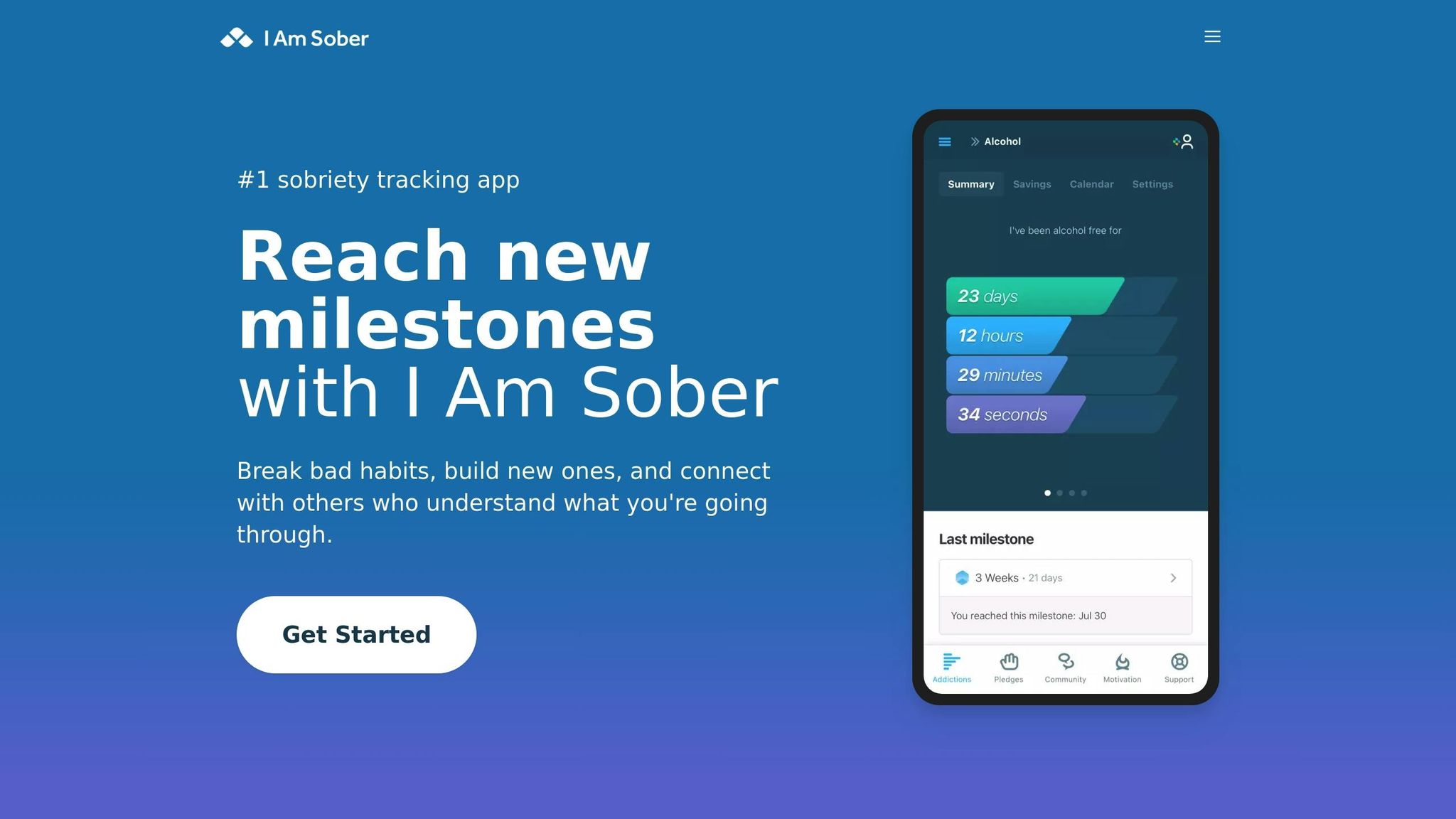
With over 5 million downloads, I Am Sober has become a popular choice for those on recovery journeys. It boasts impressive ratings – 4.9/5 on Apple and 4.8/5 on Google – and has supported 30 million recovery journeys while logging 127 million daily sobriety pledges. These stats underline its effectiveness in helping users track and celebrate their progress.
Sobriety Tracking and Milestone Celebrations
This app tracks sobriety in real time, showing users exactly how long they’ve been sober, how much money they’ve saved, and how many hours they’ve regained. These features are designed to keep motivation high. The app also celebrates key milestones, from one day to a year and beyond, making each achievement feel significant. As one user, Lexyxx13, shared on the Apple App Store:
I love how this app tracks your sobriety to the very second, and tracks how much money you’ve saved and how many hours you’ve saved since getting clean… I really love how the app celebrates all the milestones, because it’s exciting to celebrate every month sober, especially the big milestones like 100 days, 6 months, 1 year, etc.
Daily pledges further boost commitment by offering reminders and motivational quotes to keep users focused on their goals.
Evidence-Based Recovery Tools
Beyond tracking, I Am Sober incorporates evidence-based practices like CBT (Cognitive Behavioral Therapy). It provides workbook activities that encourage self-reflection and therapeutic exercises. The app’s daily check-in feature, located in the "History" section, helps users identify patterns in their behaviors, emotions, and triggers – valuable insights for long-term recovery.
For those involved in structured recovery programs, the premium Sober Plus plan offers private group features. These can complement the support found in programs like Alcoholics Anonymous, Narcotics Anonymous, SMART Recovery, or even rehab centers, providing a more personalized approach to recovery.
Building Community and Peer Support
A standout feature of I Am Sober is its thriving community. Over 11 million sobriety stories have been shared on its message boards, allowing users to connect, share experiences, and offer support. The app also hosts specialized groups tailored to different types of addiction, such as alcohol, marijuana, or self-harm, creating a safe space for users to find understanding peers. While the community boards are free, the Sober Plus subscription allows users to create private groups for closer, more personal accountability.
Accessibility and Professional Integration
The app’s free version offers essential tools, including sobriety tracking and access to community boards. For users looking for additional support, the Sober Plus subscription (which includes a seven-day free trial) unlocks advanced features like private groups and enhanced workbooks. These tools can also be shared with professionals, making it easier to align progress with structured care plans. As one user, AnneMarie T, noted:
This app has changed my life honestly! It’s helped me stay sober and the community and workbooks really help keep me on track!! Worth it if you need to change anything in your life!
2. Sober Time
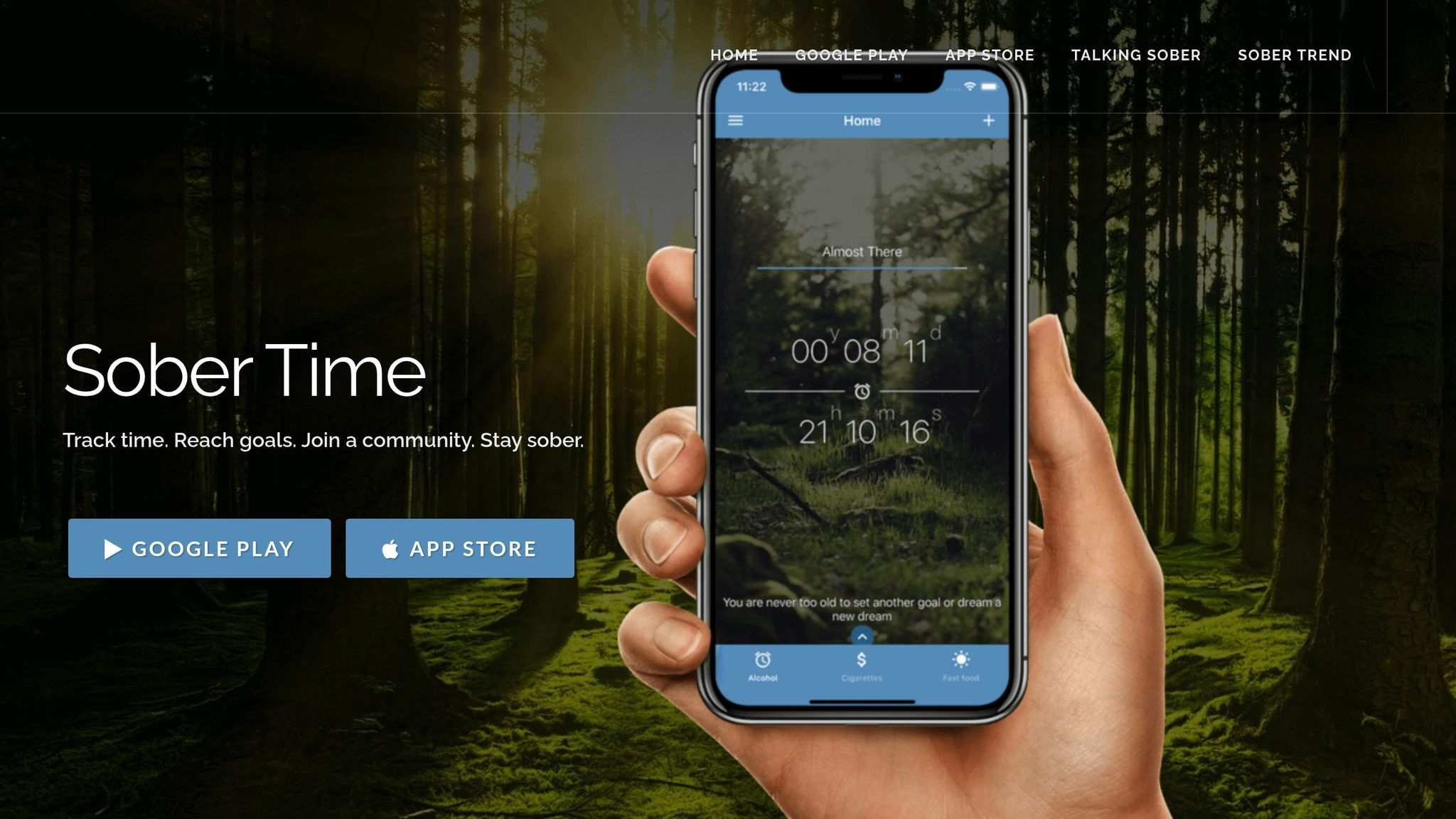
With a stellar rating of 4.8/5 on Google Play (54.9K reviews) and the App Store (25.2K ratings), Sober Time has surpassed 1 million downloads. These numbers highlight its popularity and the trust users place in its recovery-focused features.
Sobriety Tracking and Milestone Celebration Features
Sober Time excels at sobriety tracking, offering users a detailed and personalized experience. The app tracks sobriety in real-time, breaking it down into seconds, days, weeks, or months – users can even opt for unique display modes like heartbeats. Milestones are a big focus here, with pre-set goals ranging from the first five minutes to a full year, plus the option to add custom goals. The app also includes a financial tracker, helping users see how much money they’ve saved by staying sober.
Community and Peer Support Functionalities
The app fosters a sense of connection through its community forum, "Talking Sober." Here, users can share their stories, seek advice, or simply find encouragement from others on similar journeys. Newcomers can browse the forum anonymously, and those who wish to participate actively can create a free account, provided they follow the forum’s guidelines.
Integration with Evidence-Based Recovery Practices
While Sober Time isn’t a replacement for formal therapy, it incorporates tools that align with evidence-based recovery strategies. For example, the app’s built-in journal encourages users to document their thoughts, which complements techniques like CBT by helping them recognize and reframe negative thinking patterns. Users can also track multiple addictions and spot behavioral trends, offering insights that may be useful for discussions with healthcare providers. To keep motivation high, the app delivers daily inspirational messages to reinforce positive habits.
3. Nomo
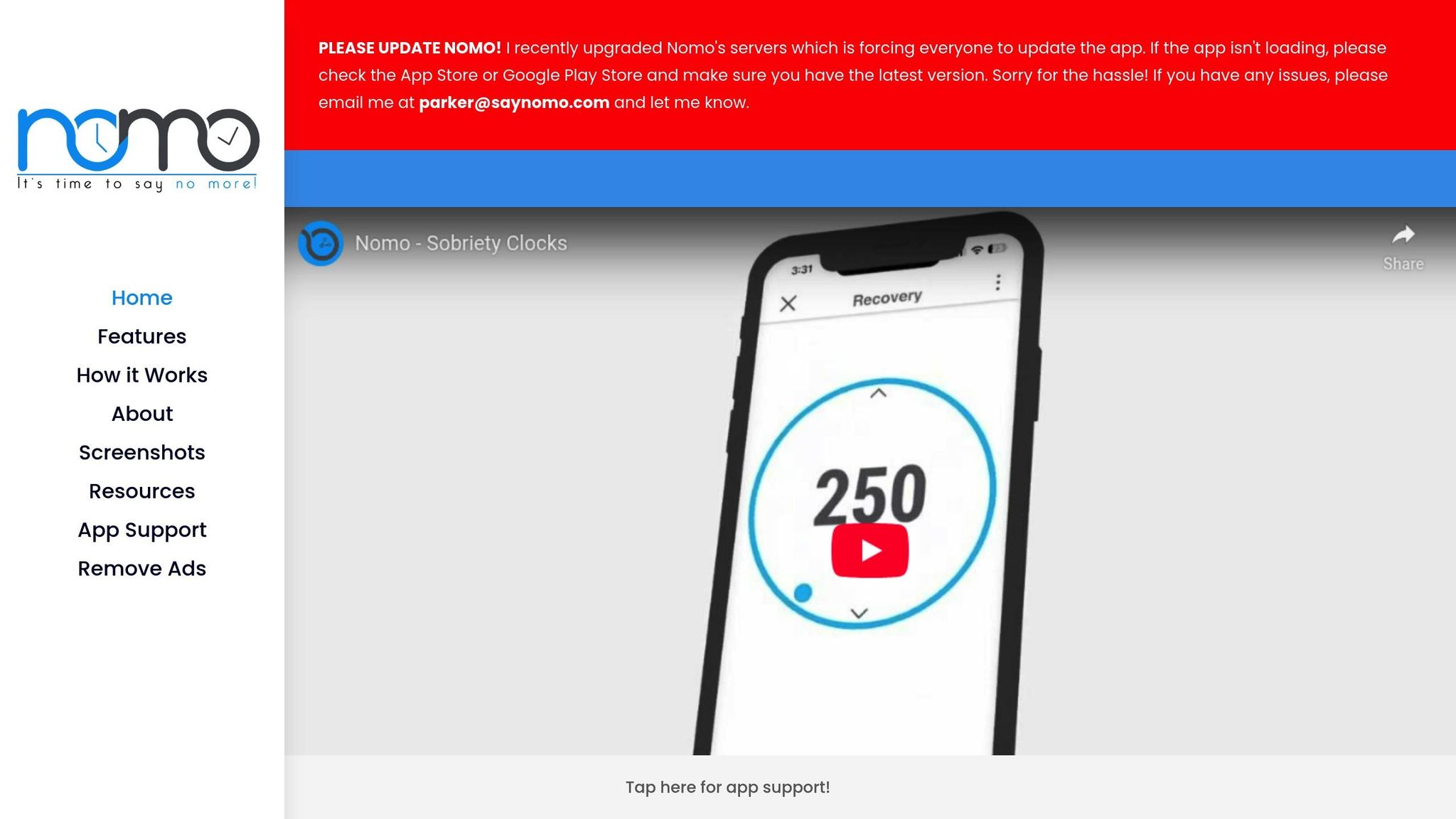
Nomo holds an impressive 4.7/5 rating on the App Store, backed by 12,600 reviews, and has facilitated the creation of over 3.59 million sobriety clocks. These numbers highlight its popularity and effectiveness in helping users stay on track with their recovery. The app combines tracking tools, community support, and therapeutic features to provide a well-rounded recovery experience.
Sobriety Tracking and Milestone Celebrations
Nomo’s sobriety clocks track your recovery progress down to the minute. But it doesn’t stop there – this app also calculates how much money you’ve saved by steering clear of addictive behaviors. This feature offers a clear, financial incentive to stay committed. On top of that, users earn badges and chips for reaching key milestones. These rewards are displayed in a gallery of achievements that you can easily share with friends and family for added encouragement.
Community and Peer Support Features
Beyond tracking, Nomo emphasizes the importance of accountability and peer support. The app allows users to connect with accountability partners, share specific sobriety clocks, and receive support during tough times. There’s also an encouragement wall where users can leave and read motivational messages. For more personal interactions, private messaging is available. And if you’re not attending regular recovery meetings, Nomo’s search feature helps you find accountability partners, ensuring you always have someone to lean on.
Tools Aligned with Proven Recovery Methods
Nomo incorporates features rooted in established therapeutic practices. The journaling tool, for example, supports cognitive behavioral therapy (CBT) by helping users track their thoughts and identify recurring patterns. Mini-exercises provide quick ways to manage impulses and refocus during moments of temptation. Additionally, the accountability partner system complements 12-step program principles, allowing users to share their sobriety clocks with sponsors or counselors. By weaving together these tools, Nomo offers a digital extension of traditional recovery strategies, helping users stay grounded in their journey.
4. WEconnect
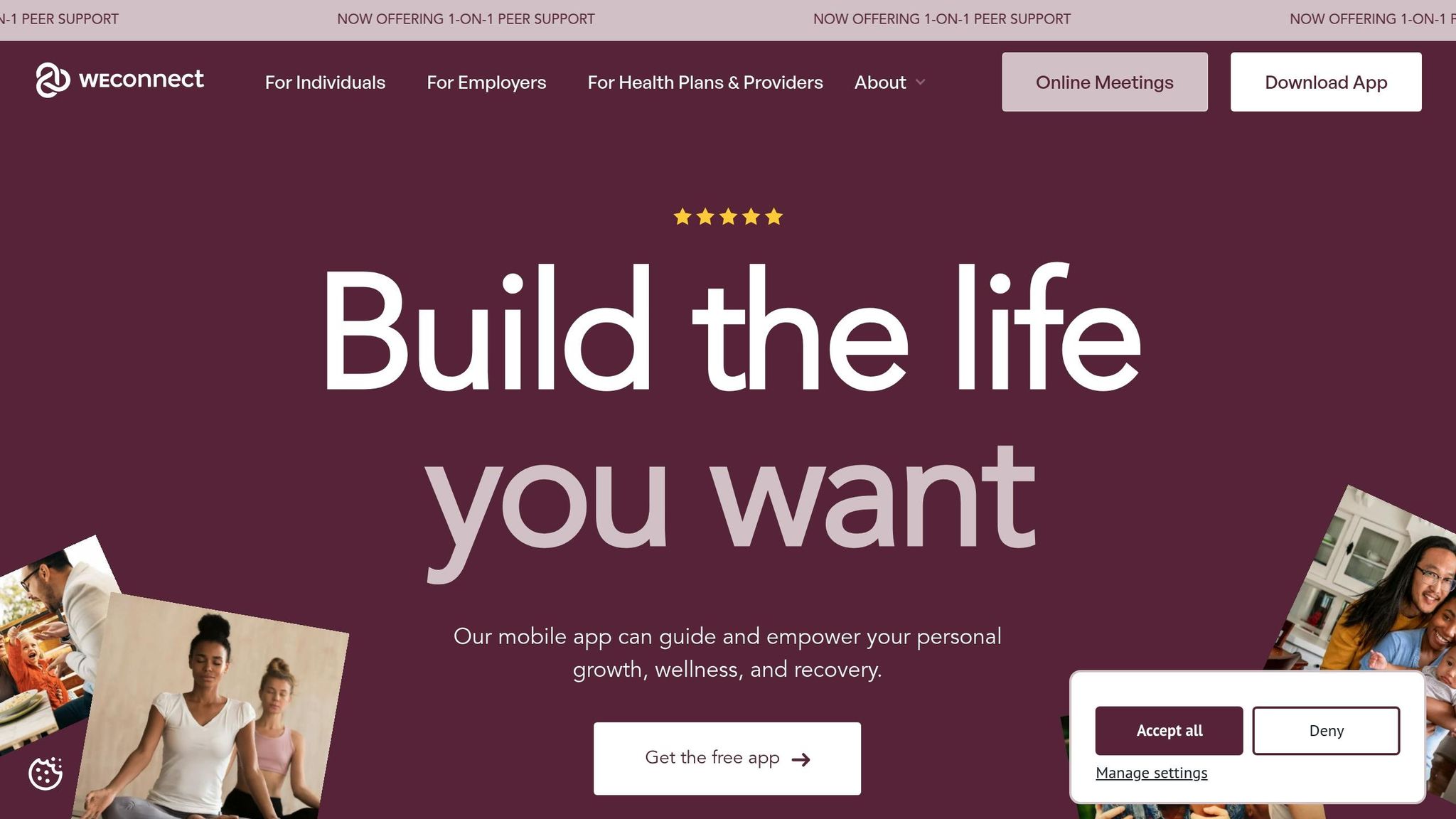
WEconnect has earned impressive ratings on both the Apple App Store (4.8/5 stars from 632 reviews) and Google Play Store (4.8/5 stars from 1.12K reviews). These ratings reflect its effectiveness in providing science-backed rewards and support for those in recovery.
Evidence-Based Recovery Tools
WEconnect incorporates Contingency Management (CM), a proven method for treating substance use disorders. Through this approach, users earn digital gift cards for completing positive actions like daily check-ins. Research shows this strategy not only boosts financial stability but also enhances overall quality of life. In fact, a December 2024 study revealed that patients using WEconnect alongside medication reduced opioid use by 35% and stayed in treatment 19% longer compared to those relying on medication alone. Additionally, 84% of users reported no substance use after six months, with 88% achieving complete abstinence from their problem substances.
Progress Tracking and Milestone Celebrations
The app’s features make it easier to track sobriety and celebrate progress. The "Insights" tab monitors meeting attendance, login streaks, and other milestones, while the "My Day" tab helps users organize daily goals, schedule self-care, and plan recovery-related activities.
Community and Peer Support
WEconnect emphasizes the power of community in recovery. The platform hosts over six meetings daily, drawing roughly 350,000 participants. These sessions are led by certified Peer Support Specialists who bring personal recovery experience to the table. Specialized meetings are available for groups like LGBTQIA+ individuals, women, and those focusing on harm reduction or grief support. For more personalized help, users can connect with peers one-on-one via chat, phone, or video. Notably, 88% of members actively engage with their peers, creating a strong, supportive network.
Flexible Access and Professional Care Integration
WEconnect ensures accessibility with a free basic version that includes unlimited access to support group meetings. For $40 per month or $350 annually, users can upgrade to a subscription that adds features like one-on-one peer support and wellness planning. These tools allow users to set personalized treatment goals, making the app a valuable complement to professional care plans.
Founder and CEO Daniela Tudor highlights the app’s impact:
"The WEconnect app leverages data for improved outcomes, and has helped thousands of patients stay in recovery. Our mission is to save lives, and I’m proud our team is doing that every day."
5. Reframe
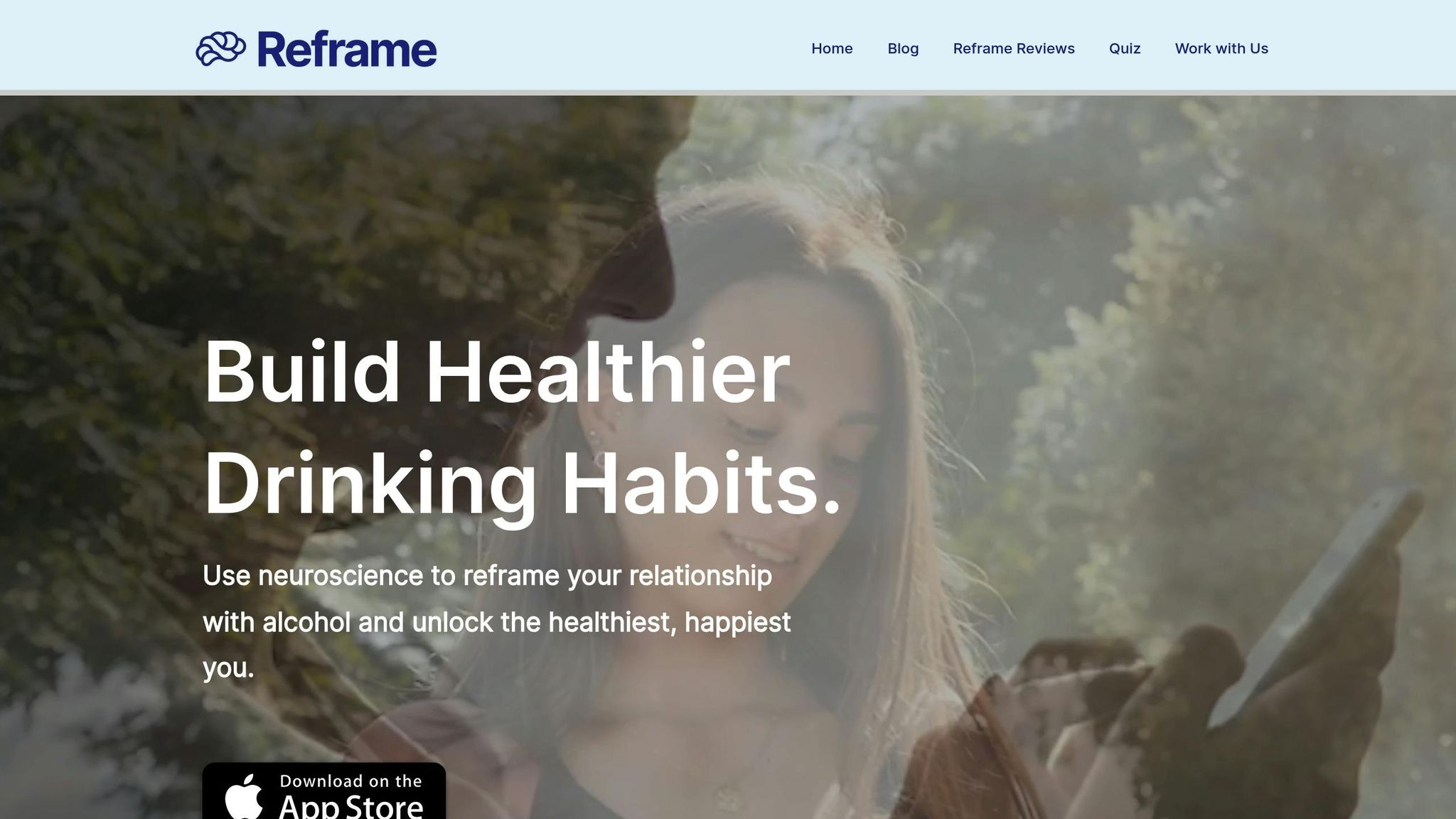
Reframe is a science-driven app designed to help users reduce alcohol consumption. With a stellar 4.8-star rating on the iOS App Store and nearly 18,000 reviews, it has already supported millions in building healthier drinking habits.
Evidence-Based Recovery Practices
Reframe’s foundation lies in evidence-based programs crafted by mental health and medical experts. The app blends mindfulness techniques with cognitive-behavioral strategies to prevent relapse, offering users a well-rounded approach to managing alcohol use. Its 160-day core program provides daily checklists and research-backed readings that dive into the neuroscience of alcohol. Additional tools include mindfulness exercises and mocktail recipes to help curb cravings. Beyond that, Reframe features both live and recorded courses on topics like workplace challenges, relationships, and mental health. As Christy Snyder, Editor at Healthline, remarked:
"I really like how science-driven the app is. I’ve learned a lot."
Tracking Progress and Celebrating Milestones
The app’s personalized drink tracker is a standout feature, enabling users to log their daily alcohol intake, participate in monthly challenges, and visualize their progress. This accountability tool has proven effective, with 91% of users reporting a significant reduction in alcohol use within three months.
Community and Peer Support
Reframe builds a sense of connection through its 24/7 private, anonymous community space, where users can share experiences and support one another. Specialized groups cater to diverse populations, including LGBTQIA+ individuals and parents, fostering inclusivity and understanding. The app’s active forum encourages users to exchange tips, celebrate milestones, and offer encouragement. As Reframe describes:
"Level up your alcohol-free or mindful drinking life with friends! Celebrate milestones or give and receive support. The journey is always better together!"
Users can also join daily Zoom check-ins for real-time community support or participate in individual and group coaching sessions.
Accessibility and Professional Integration
Reframe offers a 7-day free trial, followed by an annual subscription priced at $100. It’s designed for those aiming to cut back on drinking rather than individuals with severe alcohol use disorder (AUD) or withdrawal symptoms. By complementing professional treatment plans, Reframe provides daily tools and education to help users stay on track between therapy sessions, making it a practical digital extension of structured recovery care.
6. Sober Grid
Sober Grid is the largest sober social network in the world, uniting over 300,000 members from 170 countries who are navigating recovery from drug and alcohol addiction. The app was founded by Beau Mann, a CEO who describes himself as a "patient-entrepreneur" living with substance use disorder. Mann’s goal was to fill a critical void in recovery support.
"I’m a patient-entrepreneur. I’m a person living with substance use disorder [SUD]. I’ve had other companies, and I started Sober Grid so that I could bring a service to the market to other people like me, who have the same problems that I have."
Community and Peer Support Features
Sober Grid uses mobile technology to make peer support more accessible, blending social networking with recovery resources. Its newsfeed promotes connection and recovery-focused discussions, while the direct messaging feature allows private conversations between members. For moments of immediate need, users can activate the "Burning Desire" button to alert others for support. Additionally, the app’s GPS-based "The Grid" feature helps users locate sober individuals nearby.
The app also enables users to join groups linked to in-person sobriety support, bridging the gap between offline recovery efforts and online communities. This ensures members have access to peer support at any time.
Integration of Evidence-Based Recovery Tools
Sober Grid doesn’t stop at community building – it also incorporates clinical recovery practices. In June 2018, the company expanded its services by acquiring Ascent, a peer recovery coaching program rooted in evidence-based methods. This brought certified peer recovery coaches into the app, offering users access to professionals with firsthand recovery experience. The coaching program is priced at $99 per month after a two-week free trial and is HIPAA-compliant.
"Because many of our coaches have that lived experience, they can help and have conversations that may not necessarily be comfortable with a counselor or a therapist or probation officer. Our coaches can also help them with advocating for their own needs." – Wendy Warrington, Sober Grid Executive Administrator
The app is also partnering with researchers from the University of Pennsylvania Perelman School of Medicine and Harvard Medical School to introduce predictive AI technology, which is currently in phase two trials.
Accessibility and Integration with Professional Care
Sober Grid is designed to complement professional care plans, making it a valuable tool for mental health practitioners. It can be used to track abstinence and provide additional peer support. The app is compatible with phone accessibility features and is praised for its straightforward, user-friendly interface.
Practitioners may recommend Sober Grid as part of treatment strategies for individuals or sobriety groups, tailoring its use to align with specific recovery goals.
The app is free to download and use, ensuring accessibility for people regardless of financial circumstances. This is particularly important given that, as of 2016, fewer than one in five individuals aged 12 or older who needed substance abuse treatment actually received it. By combining community-driven support with clinical tools, Sober Grid highlights how technology can play a vital role in modern recovery efforts.
7. Quit That!
Quit That! is a simple yet powerful app designed to help users break free from addiction triggers. It combines easy-to-use tracking tools with motivational features to support individuals on their path to sobriety.
Tracking Progress and Celebrating Milestones
At the heart of Quit That! is its tracking system, which includes timers and streak counters to monitor recovery progress. Users can set personal goals and receive daily progress updates, while a streak history feature keeps them motivated by highlighting their achievements. To make the journey even more rewarding, the app includes a gamified element: motivational quotes and rewards tied to milestones. This approach not only keeps users engaged but also makes reaching each goal feel like a celebration.
Wellness Tools and Accessibility
Quit That! ensures that its core features are accessible to everyone at no cost. Its clean, user-friendly interface makes the app easy to navigate for users of all experience levels. Beyond sobriety tracking, it offers additional tools to support mental health, such as breathing exercises, sleep aids, and a recovery journal. These features create a well-rounded resource for anyone looking to improve their overall well-being while staying focused on their recovery goals.
sbb-itb-17645e5
8. SoberTool
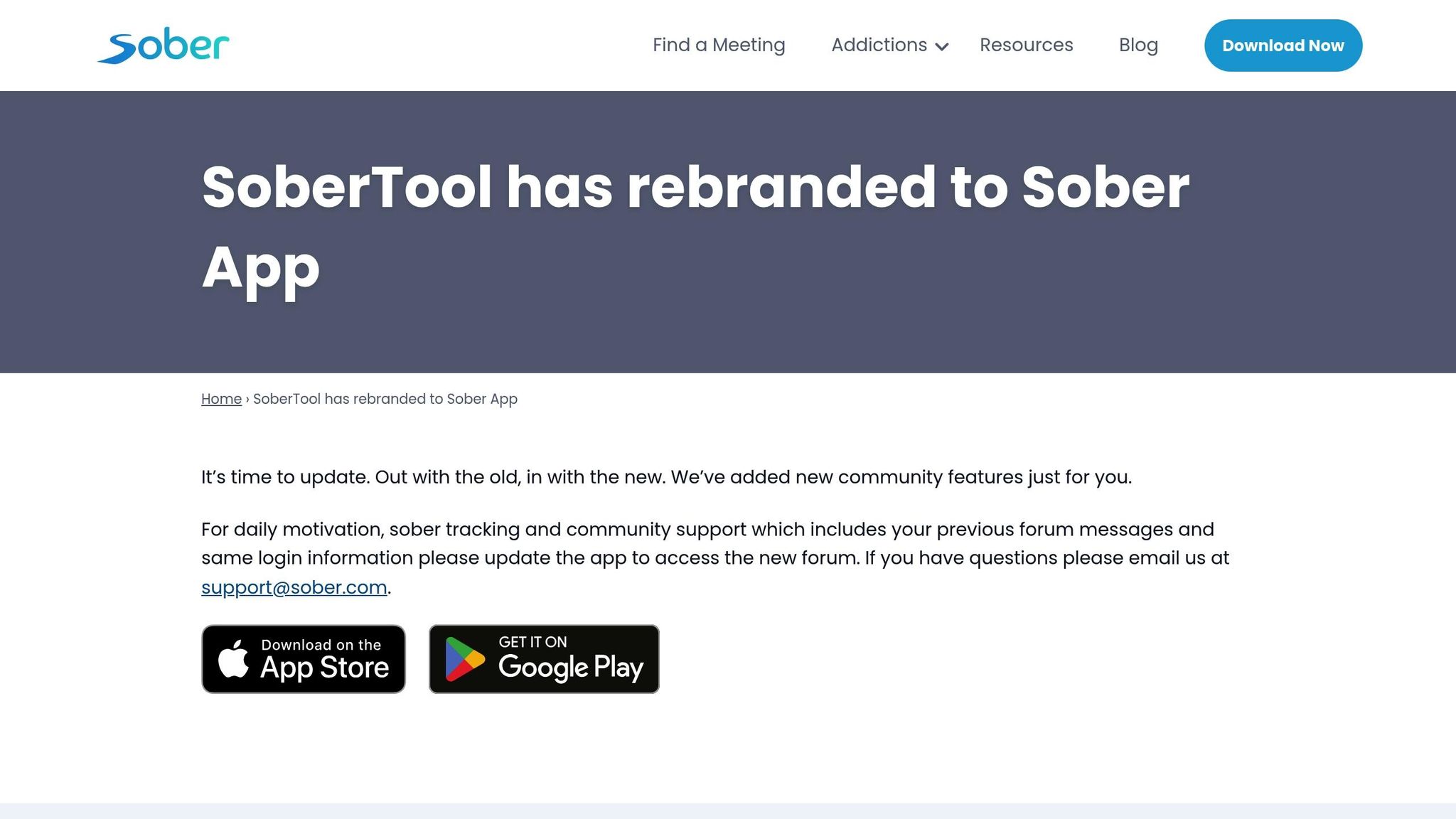
SoberTool stands out as a recovery app that blends smart tracking features with personalized support. Developed by a Harvard-educated addiction expert, this app offers a thoughtful approach to sobriety, delivering real-time help when users need it most.
Sobriety Tracking and Milestone Celebrations
At its core, SoberTool features a discreet timer that tracks sober time while also calculating the money saved – providing a tangible reminder of the financial benefits of recovery. To keep users engaged, the app sends daily motivational messages, ensuring a steady stream of encouragement.
The app also celebrates milestones with congratulatory messages and rewards, reinforcing positive habits and achievements. Notifications and prompts are carefully designed to maintain motivation and help users measure their progress. With over 100,000 downloads and an impressive 4.9/5 rating on Google Play based on 5,320 reviews, users frequently commend these motivational tools that make the recovery journey more manageable.
"SoberTool is a beneficial tool for many people in recovery. It creates reminders to keep you on track during sobriety and sends motivational messages throughout the day to keep you inspired and encouraged. Its rewards system can offer some tangible incentives to users." – Wish Recovery Luxury Rehab
Evidence-Based Support for Recovery
Beyond tracking, SoberTool incorporates exercises rooted in evidence-based recovery practices. One standout feature is its intelligent algorithm, which responds to users experiencing cravings or negative emotions. By asking a series of simple questions about their emotional state, the app provides tailored messages, exercises, or suggestions grounded in therapy principles to help users navigate difficult moments.
The app’s value is further highlighted by the fact that 4% of addiction counselors recommend it. It’s also a useful companion to professional treatment, acting as a private communication tool for therapists, treatment centers, and sponsors. Users can share their app data with therapists to fine-tune treatment plans, offering daily accountability – a feature particularly beneficial for those in remote areas or relying on telehealth services.
Best of all, SoberTool is free, making professional-grade recovery support accessible to anyone with a smartphone. Its combination of evidence-based tools and professional integration makes it an essential resource for those on the path to recovery, fitting seamlessly into a comprehensive recovery plan.
9. Twenty-Four Hours a Day
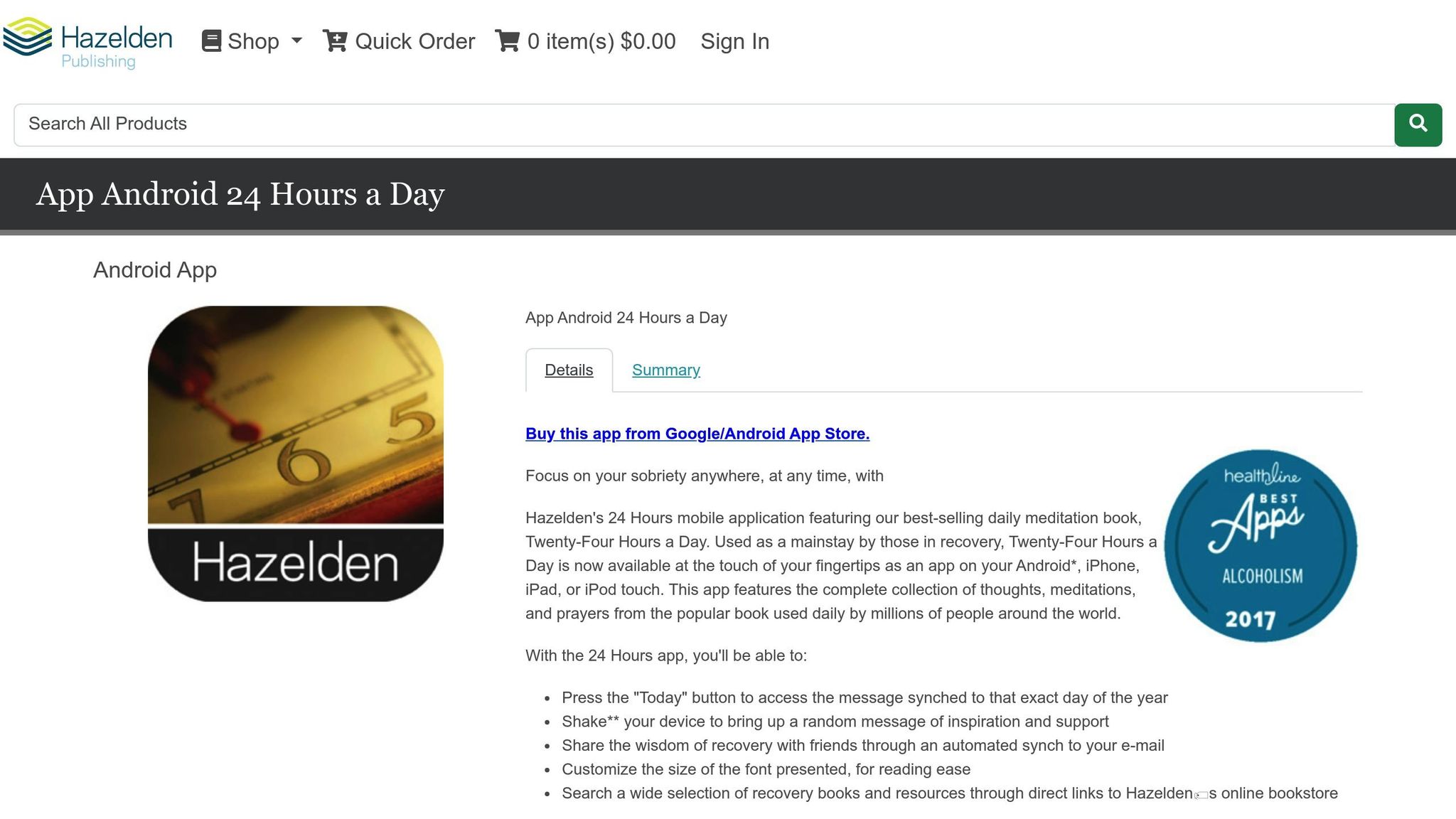
Twenty-Four Hours a Day brings the cherished wisdom of one of recovery’s most trusted resources straight to your smartphone. Inspired by the best-selling meditation book embraced by millions worldwide, this app reimagines a classic recovery tool for the digital world. It keeps the heart of the original intact while making it more accessible for today’s users.
Daily Support for Recovery
At its core, the app focuses on daily recovery practices, offering 366 meditations – one for every day of the year – to help users stay centered on their sobriety journey. Beyond meditations, it includes a rich collection of thoughts, prayers, and reflections to guide and support users. Its connection to 12-step recovery programs makes it an excellent companion for those incorporating the Twelve Steps into their lives.
The app’s features are designed to provide inspiration whenever it’s needed. The "Today" button delivers the day’s meditation with a single tap, while shaking the device brings up a random message of encouragement – perfect for moments when extra support is needed. For added convenience, users can search for specific messages by keyword or save their favorite meditations to revisit later.
Tailored Features for Accessibility
Twenty-Four Hours a Day offers several customizable features to ensure it fits seamlessly into users’ daily routines. Adjustable font sizes make reading easier, and the ability to share meditations via email can be particularly useful for those working with sponsors or recovery groups. These thoughtful touches make the app a practical tool for anyone on the path to recovery.
Published by Hazelden, a nonprofit organization dedicated to addiction recovery, the app costs $5.99 and boasts an impressive 4.9-star rating on the app store. Proceeds from app sales support initiatives aimed at helping individuals overcome addiction and its challenges.
The app is compatible with a range of devices, including Android, iPhone, iPad, and iPod touch, allowing users to access it at home, at work, or on the move. This versatility ensures that recovery support is always within reach.
10. Pear reSET
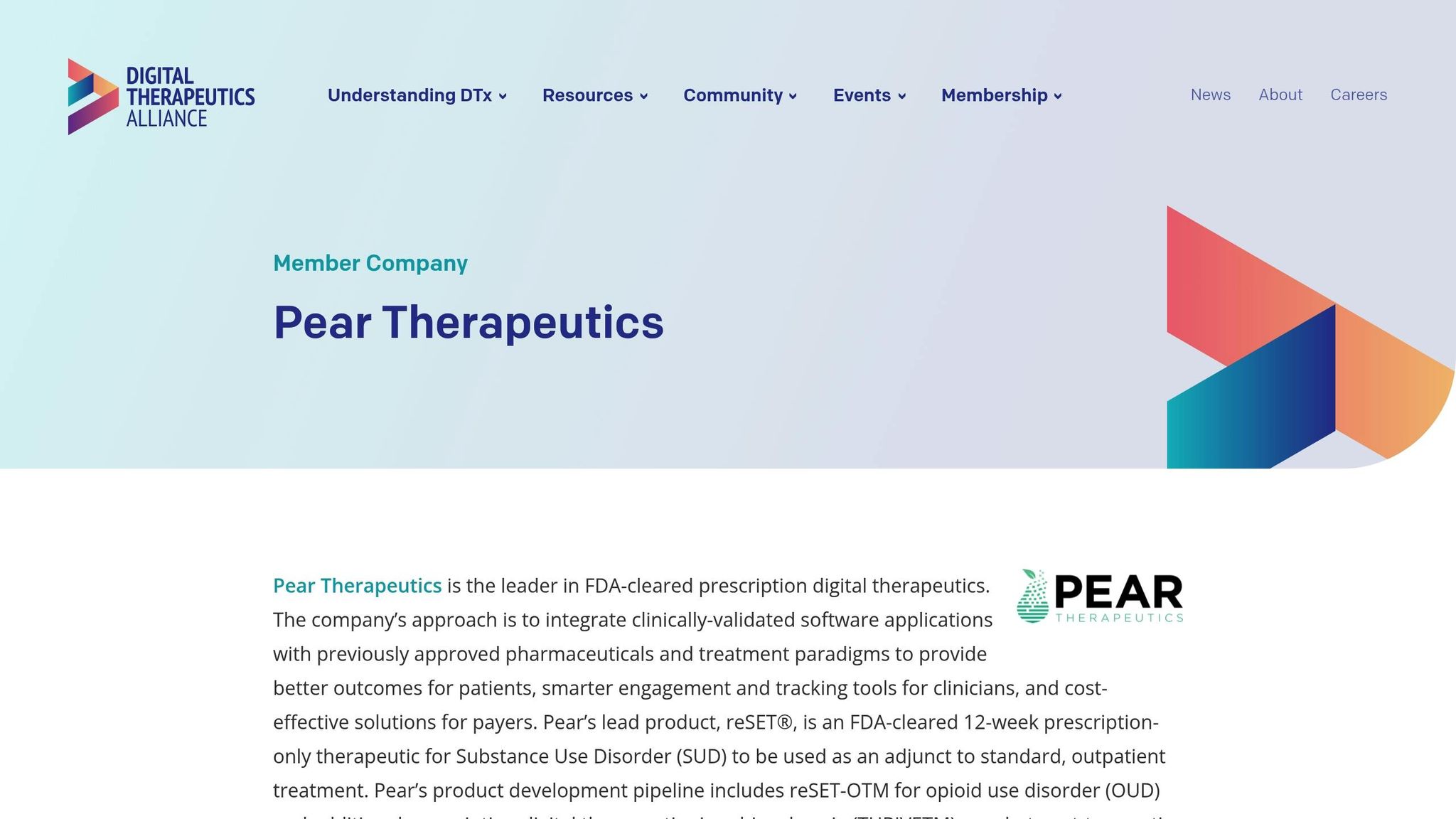
Pear reSET stands out among recovery apps by combining clinical research with user-friendly features to support individuals on their recovery journey. This digital therapeutic is designed to complement professional treatment by delivering cognitive behavioral therapy (CBT) through interactive modules, offering therapy that’s accessible anytime, anywhere.
The app is backed by strong clinical research. In a randomized clinical trial with 399 participants, 40.3% of Pear reSET users achieved abstinence, compared to just 17.6% of those who didn’t use the app. This evidence-based approach forms the backbone of its interactive tools and recovery support.
Evidence-Based Recovery Tools
Pear reSET provides a 12-week self-guided CBT program tailored to substance use recovery. The program includes fluency training and interactive lessons designed to encourage abstinence. Users can progress at their own pace and earn virtual rewards, mimicking traditional therapy incentives.
The app employs contingency management, a behavioral technique that uses rewards to motivate users to stick to their recovery goals.
"Digital therapeutics empower individuals to reclaim control over their health, advancing a new standard of care for chronic substance use disorder."
- Nick Mercadante, Founder and CEO of PursueCare
For those managing opioid use disorder, reSET-O offers a specialized program rooted in the community reinforcement approach, a CBT method tailored to OUD. This version includes features like medication tracking and is designed to work alongside medication-assisted treatment.
Seamless Integration with Professional Care
Pear reSET is designed to complement outpatient care, enhancing its clinical impact. Both reSET and reSET-O are intended for use under clinician supervision as part of a broader treatment plan [77,79]. Healthcare providers can access clinical dashboards to monitor patient progress, including self-reported substance use, cravings, and triggers. This real-time data supports more informed in-office and telehealth visits.
"Adding reSET to outpatient therapy enhances behaviors associated with recovery. It uses technology to improve abstinence and extend treatment duration."
- Richard Francis, CEO of Sandoz
The app is free to use, but some healthcare programs include it in treatment plans for $90, with reimbursement available through remote therapeutic monitoring codes [75,80].
Data from Massachusetts Medicaid highlights the app’s cost-saving benefits. Users of reSET and reSET-O saved an average of $2,011 per person in healthcare costs, with emergency room visits reduced by 45% and hospitalizations by 64%.
Pear reSET integrates seamlessly with outpatient care, allowing healthcare providers to monitor patients for medical and mental health concerns while utilizing the app’s insights for personalized and timely interventions.
11. 12 Steps AA Companion
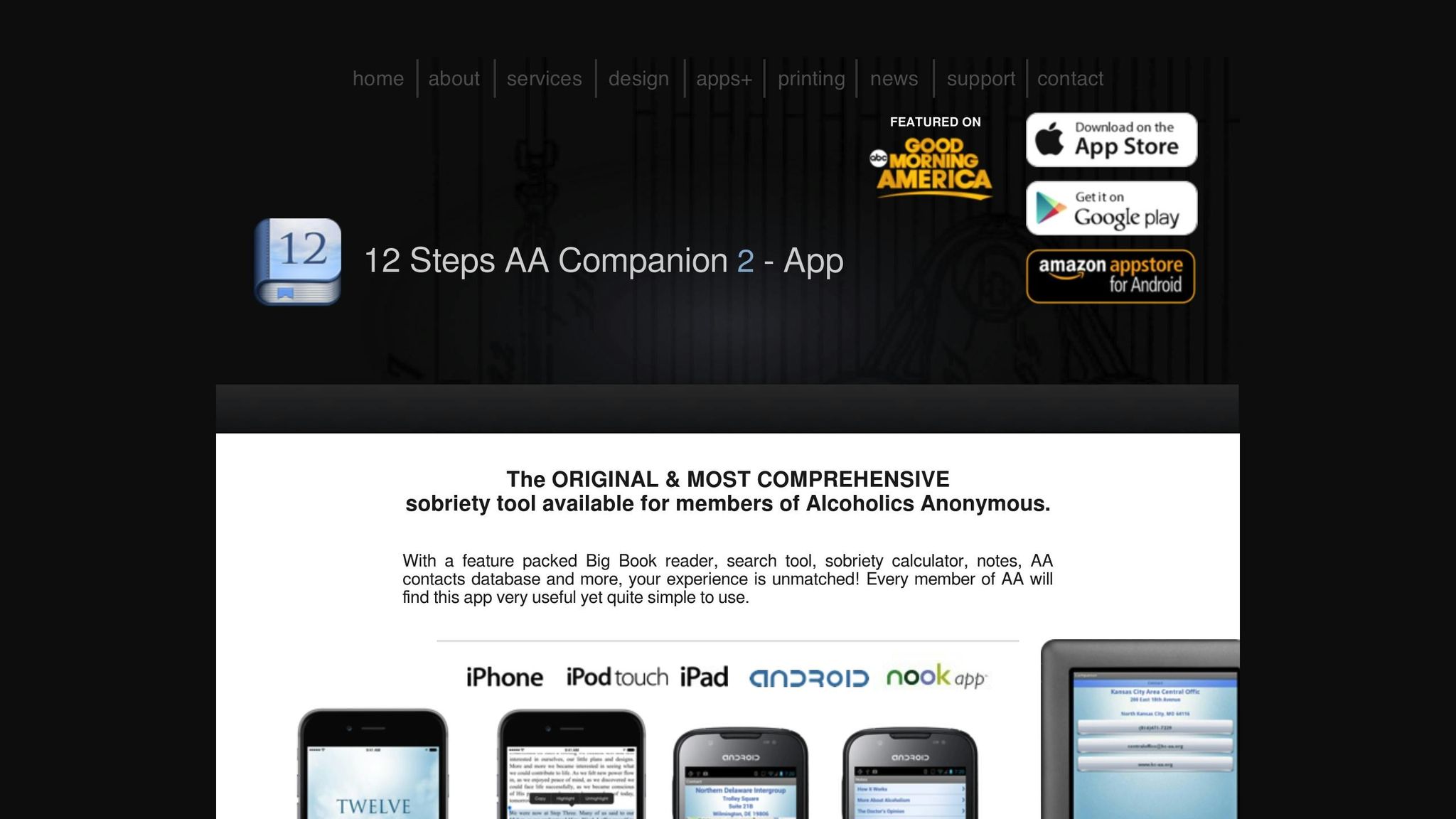
The 12 Steps AA Companion app brings the trusted tools of Alcoholics Anonymous (AA) into the digital age, making recovery resources easily accessible on your smartphone or tablet. With its offline functionality, it ensures you can use it anytime, anywhere, without needing an internet connection.
This app includes a full digital version of The Big Book, AA’s cornerstone text, complete with over 60 personal stories from the 1st and 2nd editions. Users can highlight passages, adjust font sizes for easier reading, and search for specific topics within the text. Plus, its discreet icon design helps maintain user anonymity.
Sobriety Tracking and Milestone Features
The app includes a sobriety calculator that tracks your recovery time down to the hour, displaying it in days, months, and years. Beyond personal progress, it also lets you monitor sobriety milestones for friends, making it a tool for both personal motivation and community celebration.
Bridging Digital and Traditional AA Practices
All 12 steps, AA prayers, and promises from The Big Book are available in digital format within the app. You can also take notes during meetings and share them, creating a bridge between in-person AA gatherings and digital support. The app’s resource library includes contact information for US central offices, districts, and answering services. With built-in GPS mapping, you can easily locate nearby meetings and AA contacts. These features help integrate traditional AA practices into everyday life through modern technology.
Proven Reliability and Accessibility
With over 50,000 downloads and impressive ratings – 4.7 stars on Google Play and 4.5 on the App Store – the app has earned trust within the recovery community. Its offline capabilities make it especially valuable during travel or emergencies.
Healthcare providers and treatment centers often recommend the app as part of aftercare plans, helping individuals stay connected to AA principles long after primary treatment ends. Its portability and ease of use make it a practical tool for extending support into daily life.
The app is affordably priced at $1.99 for Android users and $2.99 for iOS users, offering a cost-effective way to access a wide range of AA resources without the need to carry multiple physical books.
12. Sober Living Centers
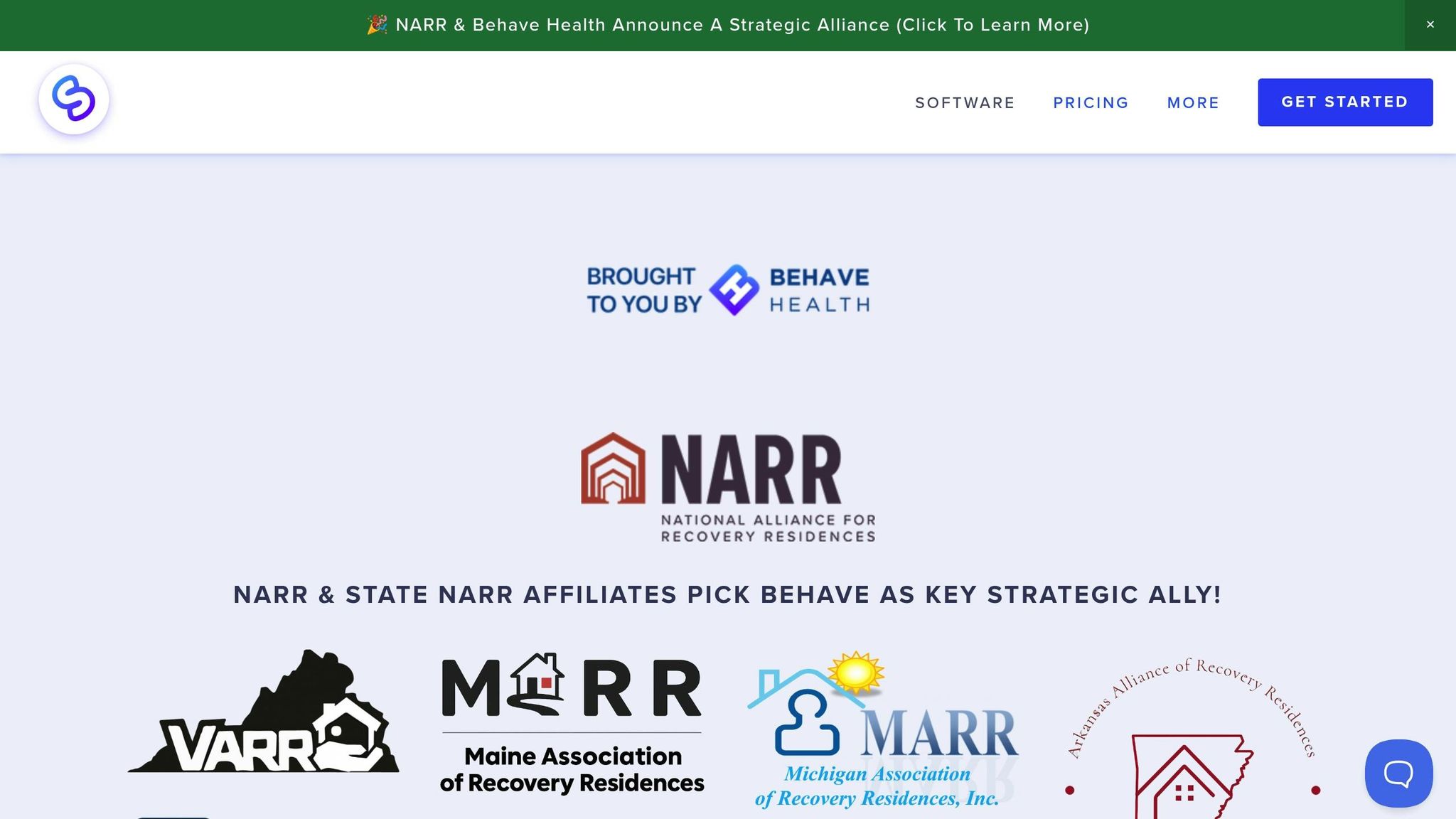
The Sober Living Centers app offers a blend of personal recovery tools and professional support features, making it a valuable resource for those navigating sobriety. Available for free on iOS, this app is tailored to assist individuals in recovery while also providing tools for the professionals guiding them. By incorporating digital tools into professional care, it enhances the recovery process in meaningful ways.
Though rooted in the principles of Alcoholics Anonymous (A.A.), the app is independent of any specific program, making it versatile for a wide range of recovery journeys. With an impressive 4.8 out of 5 rating from 665 users on the App Store, it has become a trusted companion within the recovery community.
Sobriety Tracking and Celebrating Milestones
The app helps users track their sobriety streaks and celebrates their progress with anniversary coins. These milestones can be shared with a support network, offering encouragement and motivation. For those experiencing setbacks, the app includes a reset feature, turning challenges into opportunities for growth.
"Love being able to get on my phone and reach out when needed for sobriety! I recommend this to anyone trying to get help."
– The ole dog you used, January 16, 2025
Beyond individual achievements, the app emphasizes the importance of community and connection.
Building Community and Peer Support
Sober Living Centers strengthens recovery through its community features. It connects users with family, friends, and professionals – such as house managers, case managers, recovery coaches, and counselors – creating a unified support network. This sense of connection plays a crucial role in maintaining long-term sobriety.
Integration with Professional Care Plans
The app goes beyond personal use by integrating seamlessly with professional treatment programs. It supports various professional services like admissions, alumni management, and operational coordination, making it especially helpful for individuals transitioning between care levels or living in structured recovery environments. This functionality ensures that users receive consistent and well-coordinated support throughout their journey.
How to Choose the Right Recovery App
When it comes to selecting a recovery app, the decision can feel overwhelming, especially with so many options available. But it’s important to find one that aligns with your needs and goals. Back in 2015, about 20.8 million Americans met the criteria for a substance use disorder, and approximately 1 in 12 needed treatment. With numbers like these, having access to a digital support tool that fits your situation has become increasingly valuable.
Identify Your Recovery Goals and Methods
Start by considering what you need most from a recovery app. Are you looking for something to track sobriety milestones and celebrate progress? Or maybe you’re focused on connecting with a supportive community or exploring therapeutic methods like cognitive behavioral therapy (CBT). Your specific recovery approach – whether it’s a 12-step program, medication-assisted treatment, or educational resources – should guide your choice. Some apps are tailored to these specific paths, so take the time to match your goals with what the app offers.
Evaluate Privacy and Security
Privacy is a big deal when it comes to health information. Always check if the app has a clear and transparent privacy policy. Look for details on what data is collected, why it’s collected, how it’s stored, and whether it’s shared with third parties. Apps that comply with HIPAA regulations are generally a safer bet, as these standards are designed to protect sensitive health data.
"The purpose of the evaluation is to give the psychiatrist and the patient sufficient information from which to make an informed decision that they deem correct for their situation."
– American Psychiatric Association
Make sure the app gives you control over your data, such as the option to opt out of data collection or delete your information entirely. Be cautious about apps that don’t clearly explain their security measures or data-sharing practices.
Weigh Cost Against Features
Many recovery apps offer free versions with basic tools, making them accessible to anyone. For example, Nomo provides features like sobriety tracking, journaling, and craving management at no cost. However, premium versions often come with advanced tools like personalized coaching, unlimited meetings, or specialized content. Here’s a quick comparison of some popular options:
| App | Free Version | Premium Cost | Key Premium Features |
|---|---|---|---|
| I Am Sober | Basic tracking | $9.99/month or $119.88/year | Advanced tracking and motivational content |
| WEconnect | Limited access | $40/month or $350/year | Unlimited meetings and one-on-one coaching |
| Quit That! | Basic features | $2.99/month | Enhanced tracking tools and diary features |
| Nomo | Full access | Free | Complete feature set at no cost |
Decide whether the premium features are worth the price based on your individual needs.
Check for Clinical Validation
An app’s effectiveness is another critical factor. Look for those that have been clinically tested and validated. For instance, a 12-week randomized clinical trial of Pear reSET showed a 40.3% abstinence rate, compared to just 17.6% for those who didn’t use the app. Evidence like this can help you feel confident in your choice, knowing the app has a proven track record in supporting recovery.
Consult Your Healthcare Provider
Your healthcare provider is an excellent resource when choosing a recovery app. They understand your treatment plan and can recommend tools that complement your care. If you’re unsure about an app’s safety, privacy practices, or effectiveness, don’t hesitate to seek their advice.
Consider Your Lifestyle
Finally, think about how the app fits into your daily life. Does it require regular check-ins or journaling? Make sure it feels supportive rather than overwhelming. The goal is to find an app that seamlessly integrates into your routine, helping you stay on track without adding stress. By keeping these factors in mind, you can narrow down your options and find the right tool to support your recovery journey.
Conclusion
Recovery apps are reshaping how people access support on their recovery journeys. With 67% of patients reporting they use recovery apps, these tools are making help more accessible than ever. By overcoming barriers like location, time, and mobility, they provide 24/7 access to support and treatment from virtually anywhere.
These digital tools combine technology with clinical expertise to enhance treatment.
"Digital tools personalize and accelerate access to care."
- Dr. Michael DeShields, MD, ASAM, DABAM, Medical Director with nearly 40 years of experience in addiction medicine
Smartphones have placed recovery resources directly in people’s hands. This accessibility is vital, especially when considering that nearly 75% of individuals recovering from alcohol addiction relapse within the first year – a challenge these apps are specifically designed to address.
By offering round-the-clock support, these apps provide timely coping strategies and motivation. They also enable users to seek help discreetly and anonymously, which is particularly valuable for those hesitant about in-person meetings or living in areas with limited resources.
It’s important to note that these apps are not a replacement for professional care. Instead, they serve as a powerful complement, extending the reach and benefits of traditional treatment methods.
FAQs
How can I choose the best addiction recovery app to support my needs?
Choosing the Right Addiction Recovery App
Finding the best addiction recovery app starts with understanding your own needs and goals. Are you looking to celebrate sobriety milestones, connect with a supportive community, learn effective coping strategies, or dive into educational materials? Pinpointing your focus will guide your search.
Once you know what you’re looking for, explore apps that align with those priorities. Some apps specialize in sobriety tracking, while others focus on peer support or guided exercises rooted in therapeutic practices. Take the time to read user reviews and test the app’s interface. Make sure it’s intuitive and fits seamlessly into your daily routine. A user-friendly app that meets your specific needs can make all the difference in supporting your recovery.
Can addiction recovery apps replace professional treatment, or should they be used together?
Recovery apps can be incredibly useful for keeping yourself on track, but they’re most effective when used alongside professional treatment. These apps can help you track your progress, connect with supportive communities, and access useful resources, but they’re not a substitute for therapy or medical care.
To get the most out of these tools, think of them as a complement to a well-rounded treatment plan. By pairing app usage with guidance from professionals, you can strengthen your recovery journey and boost your chances of maintaining long-term sobriety.
What steps can I take to protect my personal information when using a recovery app?
To keep your personal information safe when using a recovery app, make sure the app complies with HIPAA guidelines to protect sensitive health data. Check for essential security features like encryption, secure data storage, and role-based access controls to ensure your information stays protected.
Create a strong password and turn on two-factor authentication for an extra layer of security. Keep the app and your device updated to guard against potential vulnerabilities. Pay close attention to the permissions you grant and adjust privacy settings to minimize unnecessary data sharing. Finally, stick to downloading apps from trusted sources and read user reviews to verify their security measures.
